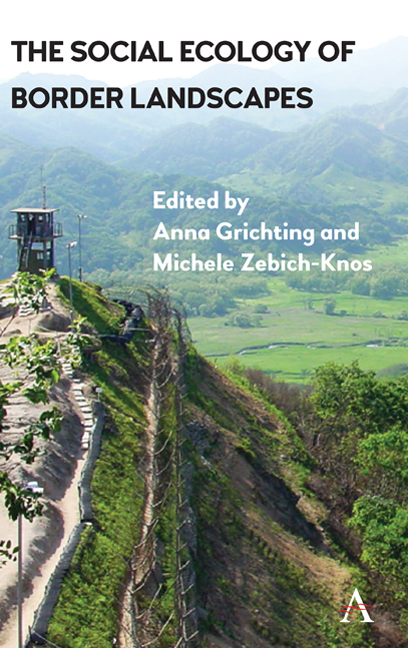Book contents
- Frontmatter
- Contents
- List of Illustrations
- Preface
- List of Contributors
- Introduction: Social Ecologies and Borderlands
- Part I FRAMES: MAPPING SOCIAL ECOLOGIES IN BORDER TERRITORIES
- Part II BRIDGES: RESILIENCE, RESTORATION AND RECLAMATION
- Chapter Four Borders as Zones of Experiential Learning: The Case of the Balkans Peace Park Project
- Chapter Five Social Ecologies in Borderlands: Crane Habitat Restoration and Sustainable Agriculture Project in the Democratic People's Republic of Korea
- Chapter Six Socio-ecological Transformations in Riparian Zones: The Production of Spaces of Exclusion and the Uneven Development of Resilience in the Sonoran Borderlands
- Chapter Seven From No-Man's Land to Every-Man's Land: Socio-ecological Approaches to Reclaiming Shared Spaces in Border Landscapes, with Examples from Germany and Cyprus
- Part III CORRIDORS: CATALYSTS AND COLLABORATION IN CONFINED SPACES
- Part IV PORTALS: DIALOGUE, EXCEPTION AND RETERRITORIALIZATION
- Conclusion: Making Sense of Social Ecology, Borders and the Environment
- Index
Chapter Four - Borders as Zones of Experiential Learning: The Case of the Balkans Peace Park Project
from Part II - BRIDGES: RESILIENCE, RESTORATION AND RECLAMATION
Published online by Cambridge University Press: 10 January 2018
- Frontmatter
- Contents
- List of Illustrations
- Preface
- List of Contributors
- Introduction: Social Ecologies and Borderlands
- Part I FRAMES: MAPPING SOCIAL ECOLOGIES IN BORDER TERRITORIES
- Part II BRIDGES: RESILIENCE, RESTORATION AND RECLAMATION
- Chapter Four Borders as Zones of Experiential Learning: The Case of the Balkans Peace Park Project
- Chapter Five Social Ecologies in Borderlands: Crane Habitat Restoration and Sustainable Agriculture Project in the Democratic People's Republic of Korea
- Chapter Six Socio-ecological Transformations in Riparian Zones: The Production of Spaces of Exclusion and the Uneven Development of Resilience in the Sonoran Borderlands
- Chapter Seven From No-Man's Land to Every-Man's Land: Socio-ecological Approaches to Reclaiming Shared Spaces in Border Landscapes, with Examples from Germany and Cyprus
- Part III CORRIDORS: CATALYSTS AND COLLABORATION IN CONFINED SPACES
- Part IV PORTALS: DIALOGUE, EXCEPTION AND RETERRITORIALIZATION
- Conclusion: Making Sense of Social Ecology, Borders and the Environment
- Index
Summary
Introduction
National borders are synthetic constructs that may be defined by some geographic features such as rivers or mountain ranges, but essentially remain figments of political expediency. However, social systems evolve around them to provide a unique context for learning the interface between society and ecology. This chapter provides a concise historiography of the development of an initiative in the western Balkans that sought to harness such learning opportunities “between the lines” through experiential field education. The challenges and criticism faced by the progenitors of this initiative are considered in the post-conflict reconstruction and reconciliation landscape of the Balkans. Conflict transformation requires empowerment of agents of change, and this is a core component of the experiential peace-building process, especially in terms of helping participants understand the shared meaning of their experience. Such empowerment is often the goal of small-scale peace-building initiatives that target people with influence in divided communities, so that they will be able to apply what they have learned in their home constituencies. This is often done through joint cooperative initiatives or projects that allow a transformed group of people from each side of the divide to have a platform to reach out and extend their transformation to others in their communities. In our understanding, this approach to peace building rests on four criteria: (1) the responsibility and judgment of being empowered; (2) the conscious use of symbolism and ritual to create meaningful images, metaphors and experiences; (3) the transference of individual transformation back into the community; and (4) the reframing of community relationships so as to counter prevailing stereotypes and to inspire a positive notion of the “other” through a real-world example. The Balkans Peace Park Project (B3P) sought to use such a framework to further its goals of peace education and also to foster a better appreciation of the social ecology of this complex border landscape.
The Birth of the Balkans Peace Park Project (B3P)
The story starts with a flash of inspiration from one intrepid woman following her wanderlust in the footsteps of a famous British explorer, Edith Durham, who trekked by horseback through the Dinaric Alps at the turn of the century — before communism lowered its Iron Curtain of isolationism and paranoia.
- Type
- Chapter
- Information
- The Social Ecology of Border Landscapes , pp. 71 - 88Publisher: Anthem PressPrint publication year: 2017



